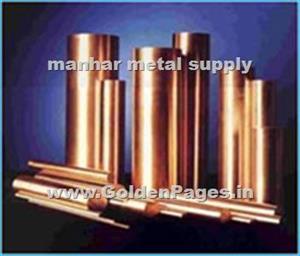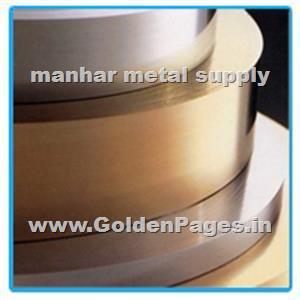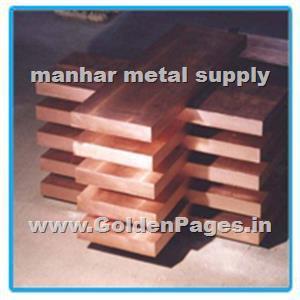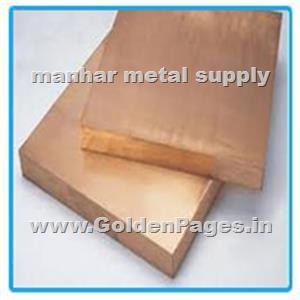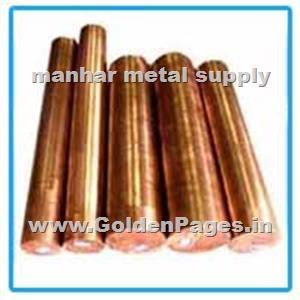MANHAR METAL SUPPLY CORPORATION
Featured Products
Highest quality standards are achieved through the implementations of latest technology, decades of experience and everlasting moral values , which have helped us to retain our customers as well as multiply them.
Welcome to MANHAR METAL SUPPLY CORPORATION
Titanium
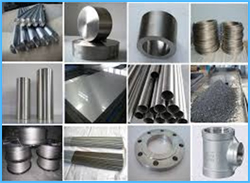
Titanium Grades:-Manhar Metal Supply Corporation Supplies Titanium In Different Grades. We Have Titanium Grade 1, Grade 2, Grade 5, Grade 7, Grade 9, And Grade 12.
Titanium And Its Alloys Have Proven To Be Technically Superior And Cost-Effective Materials Of Construction For A Wide Variety Of Aerospace, Industrial,Surgical Implants, Gold Refinery , Anodising Plants , Heater For Industrial Use , Marine And Commercial Applications. In North America,Approximately 70% Of The Titanium Consumed Is Utilized For Aerospace Applications.Due To The Expansion Of Existing Applications And The Development Of New Uses, The Greatest Growth Will Occur In The Industrial, Marine And Commercial Sectors
Titanium is as strong as steel but much less density. It is therefore important as an alloying agent with many metals including aluminium, molybdenum and iron. These alloys are mainly used in aircraft, spacecraft and missiles because of their low density and ability to withstand extremes of temperature. They are also used in golf clubs, laptops, bicycles and crutches.
Power plant condensers use titanium pipes because of their resistance to corrosion. Because titanium has excellent resistance to corrosion in seawater, it is used in desalination plants and to protect the hulls of ships, submarines and other structures exposed to seawater.
Titanium metal connects well with bone, so it has found surgical applications such as in joint replacements (especially hip joints) and tooth implants.
The largest use of titanium is in the form of titanium(IV) oxide. It is extensively used as a pigment in house paint, artists’ paint, plastics, enamels and paper. It is a bright white pigment with excellent covering power. It is also a good reflector of infrared radiation and so is used in solar observatories where heat causes poor visibility.
Titanium (IV) oxide is used in sunscreens because it prevents UV light from reaching the skin. Nanoparticles of titanium (IV) oxide appear invisible when applied to the skin.
The Properties And Characteristics Of Titanium Which Are Important To Design Engineers In A Broad Spectrum Of Industries Are:
Excellent Corrosion Resistance: Titanium Is Immune To Corrosive Attack By Salt Water Or Marine Atmosphere. It Also Exhibits Exceptional Resistance To A Broad Range Of Acids , Alkalis, Natural Waters And Industrial Chemicals.
Superior Erosion Resistance: Titanium Offers Superior Resistance To Corrosion, Cavitation Or Impingemnet Aatack. Titanium Is Atleast 20 Times More Erosion Resistance Than Copper Nickel Alloys
High Heat Transfer Efficiency: Under”In Service” Conditions, The Heat Transfer Properties Of Titanium Approximate Those Of Admirately Brass And Copper Nickel.There Are Several Reasons For This: 1) Titanium’s Higher Strength Permits The Use For Thinner Walled Equipment. 2) There Appears To Be Unusual And Benefical Characteristics In Titanium’s Inherent Oxide Film. 3) The Relative Absence Of Corrosion In Media Where Titanium Is Generally Used Leaves The Surface Bright And Smooth For Improved Lamellar Flow. 4) Titanuim’s Excellent Erosion-Corrosion Resistance Permits Significantly Higher Operating Velocities.
Superior Strength to weight Ratios
The Densities Of Titanium-Based Alloys Range Between 160 Lb/In3(4.43gm/Cm3) And 175lb/In3(4.85 Gm/Cm3).Yield Strengths Range From 25,000 Psi(172 Mpa )Commercially Pure(Cp) Grade 1 To Above 200,000 Psi (1380 Mpa) For Heat Threated Beta Alloys.The Combination Of High Strength And Low Density Results In Exceptionally Favorable Strength-To-Weigth Ratios For Titanium Based Alloys.These Ratios For Titanium Based Alloys Are Superior To Almost All Other Metals And Become Important In Such Diverse Applications As Deepwell Tube Strings In The Petroleum Industry And Surgical Implants In The Medical Field.
Special Information For Fraction of Titanium
Keeps tools Sharp
Titanium Has A Tendency To Gall, And Its Chips Can Weld To The Cutting Edged Of The Tool. This Is Particularly So Once Tool Wear Begins.Sharp Tools Should E Employed At All Times And Should Be Replaced Before They Dull. The Feed Should Not Be Stopped While The Tool And Work Piece Are In Moving Contact.
Grinding Of Titanium
In Grinding,The Difference Between Titanium And Other Metals Is The Activity Of Titanium At High Temperatures.At The Localized Points Of Wheel Contact Titanium Can React Chemically With The Wheel Material.The Most Important Facts To Consider In Order To Prevent This And Ensure Successful Grinding.
Joining Of Titanium
Titanium And Titanium Alloys Can Be Readily Joined By Normal Mechanical Fastener Techniques.With The Exception Of Brazing And Friction Welding,These Methods Are The Only Satisfactory Means Of Making Joints Between Two Nonweldable Titanium Alloys Or Between Titanium And Dissimilar Materials.
Hints For making Titanium
Titanium Can Be Fabricated Using Techniques Which Are No More Difficult Than Those Used To Machine Type 316 Stainless Steel.Commercially Pure Grades Of Titanium With Tensile Strengths Of 35,000 To 80,000 Psi Machine Fabricate For Easier Than The Aircraft I.E. 6al-4v With Tensile Strenghts Up To 200,000 Psi.
Welding Titanium
In General,Welding Of Titanium And Its Alloys Can Be Readily Performed, But It Is Necessary To Exclusive Reactive Gases,Including Oxygen And Nitrogen From The Air,And To Maintain Cleanliness.Thus Weld Properties Are Heavily Influenced By Welding Procedured, Especially By The Adequacy Of Insert Gas Shielding.
Fire Prevension
Storage Of Coarse Titanium Turnings And Chips Is Relatively Safe. Storage Or Accumulation Of Titanium Fines Constitues A Fire Hazard.Clean Machines And Good Workshop Practice Are Usually Sufficient To Avoid Any Danger Of Fire When Machining Titanium.
Application
Titanium Is Used In Steel As An Alloying Element (Ferro) To Reduce Grain Size And As A Deoxidizer, And In Stainless Steel To Reduce Carbon Content. Titanium Is Often Alloyed With Aluminium (To Refine Grain Size), Vanadium, Copper (To Harden), Iron, Manganese, Molybdenum, And With Other Metals. Applications For Titanium Mill Products (Sheet, Plate, Bar, Wire, Forgings, Castings) Can Be Found In Industrial, Aerospace, Recreational, And Emerging Markets. Powdered Titanium Is Used In Pyrotechnics As A Source Of Bright-Burning Particles.
Industrial
Welded Titanium Pipe And Process Equipment (Heat Exchangers, Tanks, Process Vessels, Valves) Are Used In The Chemical And Petrochemical Industries Primarily For Corrosion Resistance. Specific Alloys Are Used In Down Hole And Nickel Hydrometallurgy Applications Due To Their High Strength (E. G.: Titanium Beta C Alloy), Corrosion Resistance, Or Combination Of Both. The Pulp And Paper Industry Uses Titanium In Process Equipment Exposed To Corrosive Media Such As Sodium Hypochlorite Or Wet Chlorine Gas .Other Applications Include: Ultrasonic Welding Wave , Wave Soldering, And Sputtering Targets. Titanium tetrachloride a colorless liquid, is important as an intermediate in the process of making and is also used to produce the Ziegler-Natta catalyst.
Titanium Tank
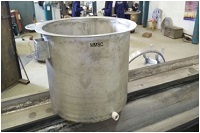
|
Titanium Tank For Gold Refinery
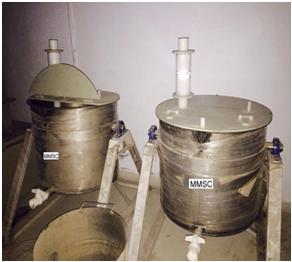
|
Titanium Tank For Chemical Process
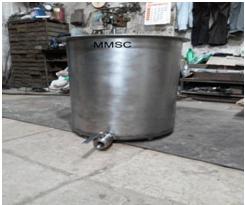
|
Titanium Pan
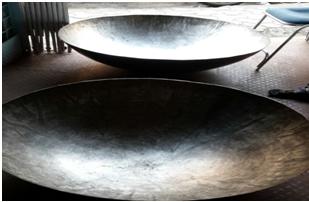
|
Titanium Cooling Coil
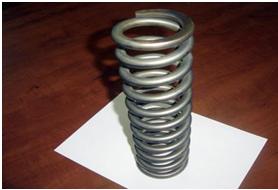
|
Titanium Crucibal
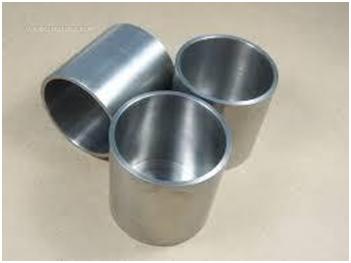
|
Our Vision
* To embrace new technologies and methods. * To give unsurpassed products and services to the clients. * To constantly look for improvement and changes.



